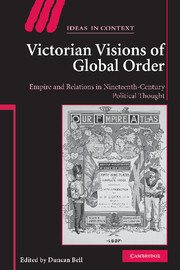 Victorian Visions of Global Order
Victorian Visions of Global Order Published online by Cambridge University Press: 22 September 2009
INTRODUCTION
A feature of British nineteenth-century political and legal thinking was a sustained and direct engagement with empire. Victorian political thinkers were a pivotal part of a trans-national exchange in the ideas and practice of civil society and government. The British empire in India provides the most striking illustration of this exchange; some theorists, like the Mills, were employed in the East India Company; others like Henry Maine and James Fitzjames Stephen were colonial administrators for the Raj; and yet others like Burke, Bentham, Malthus, and Richard Price incorporated Indian affairs into their reflections on political economy and theory. One imperial issue in particular absorbed their attention – the transformation of law in India, and more particularly the primarily utilitarian ambition to frame codes of law for India. Because this ambition was also central to British dominance of the sub-continent, political theorists from Mill to Maine were drawn closely into the actual exercise of imperial power. In turn, their engagement with imperial governance had an impact on domestic conversations about legal reform, and more precisely about the relationship between law and the development and progress of civil societies.
To save this book to your Kindle, first ensure no-reply@cambridge.org is added to your Approved Personal Document E-mail List under your Personal Document Settings on the Manage Your Content and Devices page of your Amazon account. Then enter the ‘name’ part of your Kindle email address below. Find out more about saving to your Kindle.
Note you can select to save to either the @free.kindle.com or @kindle.com variations. ‘@free.kindle.com’ emails are free but can only be saved to your device when it is connected to wi-fi. ‘@kindle.com’ emails can be delivered even when you are not connected to wi-fi, but note that service fees apply.
Find out more about the Kindle Personal Document Service.
To save content items to your account, please confirm that you agree to abide by our usage policies. If this is the first time you use this feature, you will be asked to authorise Cambridge Core to connect with your account. Find out more about saving content to Dropbox.
To save content items to your account, please confirm that you agree to abide by our usage policies. If this is the first time you use this feature, you will be asked to authorise Cambridge Core to connect with your account. Find out more about saving content to Google Drive.